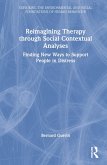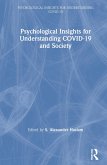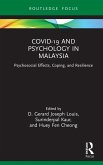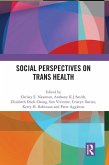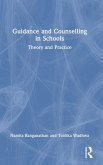Handbook of Personal Security
Herausgeber: Carroll, Patrick J; Wichman, Aaron L; Arkin, Robert M
Handbook of Personal Security
Herausgeber: Carroll, Patrick J; Wichman, Aaron L; Arkin, Robert M
- Gebundenes Buch
- Merkliste
- Auf die Merkliste
- Bewerten Bewerten
- Teilen
- Produkt teilen
- Produkterinnerung
- Produkterinnerung
This handbook features the latest theory and research examining the cognitive, emotional, and behavioral responses to security threats.
Andere Kunden interessierten sich auch für
![Reimagining Therapy through Social Contextual Analyses Reimagining Therapy through Social Contextual Analyses]() Bernard GuerinReimagining Therapy through Social Contextual Analyses193,99 €
Bernard GuerinReimagining Therapy through Social Contextual Analyses193,99 €![Psychological Insights for Understanding COVID-19 and Society Psychological Insights for Understanding COVID-19 and Society]() Psychological Insights for Understanding COVID-19 and Society178,99 €
Psychological Insights for Understanding COVID-19 and Society178,99 €![COVID-19 and Psychology in Malaysia COVID-19 and Psychology in Malaysia]() COVID-19 and Psychology in Malaysia69,99 €
COVID-19 and Psychology in Malaysia69,99 €![Social Perspectives on Trans Health Social Perspectives on Trans Health]() Social Perspectives on Trans Health179,99 €
Social Perspectives on Trans Health179,99 €![Power, Resistance and Liberation in Therapy with Survivors of Trauma Power, Resistance and Liberation in Therapy with Survivors of Trauma]() Taiwo AfuapePower, Resistance and Liberation in Therapy with Survivors of Trauma150,99 €
Taiwo AfuapePower, Resistance and Liberation in Therapy with Survivors of Trauma150,99 €![Handbook of Arab American Psychology Handbook of Arab American Psychology]() Handbook of Arab American Psychology394,99 €
Handbook of Arab American Psychology394,99 €![Guidance and Counselling in Schools Guidance and Counselling in Schools]() Namita RanganathanGuidance and Counselling in Schools178,99 €
Namita RanganathanGuidance and Counselling in Schools178,99 €-
-
-
This handbook features the latest theory and research examining the cognitive, emotional, and behavioral responses to security threats.
Produktdetails
- Produktdetails
- Verlag: Taylor & Francis Ltd (Sales)
- Seitenzahl: 380
- Erscheinungstermin: 1. Mai 2015
- Englisch
- Abmessung: 254mm x 178mm x 22mm
- Gewicht: 907g
- ISBN-13: 9781848726758
- ISBN-10: 1848726759
- Artikelnr.: 41760351
- Verlag: Taylor & Francis Ltd (Sales)
- Seitenzahl: 380
- Erscheinungstermin: 1. Mai 2015
- Englisch
- Abmessung: 254mm x 178mm x 22mm
- Gewicht: 907g
- ISBN-13: 9781848726758
- ISBN-10: 1848726759
- Artikelnr.: 41760351
Patrick J. Carroll is currently an Associate Professor of Psychology at The Ohio State University-Lima. After receiving his PhD from the University of Florida, he was a National Institute of Mental Health Postdoctoral Fellow at The Ohio State University. His research focuses on the social revision of identity and the ultimate consequences of those identity revisions for mental health and well-being. In addition to his published articles, Carroll co-edited the 2010 Handbook of the Uncertain Self. He has also served as an editorial consultant for several journals as well as co-associate editor for a 2006 special issue of Basic and Applied Social Psychology on Security in the aftermath of 9/11. Robert M. Arkin is a Professor of Psychology at The Ohio State University. He earned his Ph.D. from the University of Southern California. His research concerns the self in social interaction, with special emphasis on the uncertain self (self-doubt; self-handicapping and overachievement; personal security and insecurity). He is also editor of the 2011 book Most Underappreciated: 50 Prominent Social Psychologists Describe Their Most Unloved Work, and Handbook of the Uncertain Self. In addition to his many articles, Arkin has served in an editing role for several important journals in his discipline, including the Journal of Personality and Social Psychology, Personality and Social Psychology Bulletin, and Basic and Applied Social Psychology. Aaron L. Wichman is an Associate Professor of Psychological Sciences at Western Kentucky University. He earned his Ph.D and did post-doctoral work at the Ohio State University. His publications span a variety of topics, ranging from responses to psychological threat, uncertainty, and optimism and pessimism, to statistics. His research focuses on how people respond to different types of psychological threats and the many applications of the threat response/coping process.
Introduction and Overview. Part 1. Personal Security in Individual Contexts. Security and Uncertainty in Contemporary Delayed-Return Cultures: Coping with the Blockage of Personal Goals
K. van den Bos
I. McGregor
L. Martin. Being Threatened and Being a Threat Can Increase Reliance On Thoughts: A Self-Validation Approach
P. Briñol
K. G. DeMarree
R. E. Petty. Psychological Insecurity and Leadership Styles
C. Schoel
D. Stahlberg
C. Sedikides. The Psychology of Defensiveness: An Integrative Security System Model of Attachment
Self-esteem
and Worldviews
J. Hart. Part I Commentary
C. Holbrook
D. Fessler. Part 2. Personal Security in Interpersonal Contexts. Narcissism and Protection Against Social Threat
S.D. Freis
A.A. Brown
R.M. Arkin. Regulating Relationship Security of Chronically Insecure Partners
E. Lemay. An Attachment Perspective on Personal Security
M. Milkulincer
P.R. Shaver. Attachment Security and Prosociality: Dynamics
Underlying Mechanisms
and Implications
O. Gillath
G. Karantzas. A Goal Circumplex Model of Security Strivings in Social and Cultural Context
K. Tomczyk
B. Yu
X. Zhou. Ostracism Threatens Personal Security: A Temporal Need Threat Framework
E. D. Wesselmann
A. Hales
D. Ren
K. D. Williams. Part II Commentary
M. Clark
K. Von Culin
J. Hirsch. Part 3. Personal Security in Cultural and Health Contexts. Security Seeking in a Regulatory Focus Whodunit: The Case of the Relative Orientation in Behavioral Economics
G. Leonardelli
V. Bohns
J. Gu. Achieving Existential Security through Symbolically Fusing Secular and Religious Sources of Control and Order
A. Kay
S. Shepherd
R. Eibach. Responding to Psychological Threats with Deliberate Ignorance: Causes and Remedies
J. Shepperd
J. Howell. Uncertainty in Healthcare: A Multi-Level Approach
S. Andrews
K. Sweeny. Part III Commentary
A.J. Rothman
A. K. Farrell
L. Auster-Gussman. Part 4. Interdisciplinary Analyses of Personal Security. "Fear Appeals" and Security in American Foreign Relations
C. Fettweis. Terrorism
Personal Security
and Responsible Policy Making
J. Mueller
M.G. Stewart. Secure in Their Beliefs: Personal Security
the Quest for Personal Significance
and the Psychology of Extremism
A. Kruglanski
N. Schori-Eyal. Ecology and Evolution of Personal Security: Adaptive Interdependence of the Individual and the Collective
R. Sagarin. Part IV Commentary
T. Kolditz
J. Lovelace.
K. van den Bos
I. McGregor
L. Martin. Being Threatened and Being a Threat Can Increase Reliance On Thoughts: A Self-Validation Approach
P. Briñol
K. G. DeMarree
R. E. Petty. Psychological Insecurity and Leadership Styles
C. Schoel
D. Stahlberg
C. Sedikides. The Psychology of Defensiveness: An Integrative Security System Model of Attachment
Self-esteem
and Worldviews
J. Hart. Part I Commentary
C. Holbrook
D. Fessler. Part 2. Personal Security in Interpersonal Contexts. Narcissism and Protection Against Social Threat
S.D. Freis
A.A. Brown
R.M. Arkin. Regulating Relationship Security of Chronically Insecure Partners
E. Lemay. An Attachment Perspective on Personal Security
M. Milkulincer
P.R. Shaver. Attachment Security and Prosociality: Dynamics
Underlying Mechanisms
and Implications
O. Gillath
G. Karantzas. A Goal Circumplex Model of Security Strivings in Social and Cultural Context
K. Tomczyk
B. Yu
X. Zhou. Ostracism Threatens Personal Security: A Temporal Need Threat Framework
E. D. Wesselmann
A. Hales
D. Ren
K. D. Williams. Part II Commentary
M. Clark
K. Von Culin
J. Hirsch. Part 3. Personal Security in Cultural and Health Contexts. Security Seeking in a Regulatory Focus Whodunit: The Case of the Relative Orientation in Behavioral Economics
G. Leonardelli
V. Bohns
J. Gu. Achieving Existential Security through Symbolically Fusing Secular and Religious Sources of Control and Order
A. Kay
S. Shepherd
R. Eibach. Responding to Psychological Threats with Deliberate Ignorance: Causes and Remedies
J. Shepperd
J. Howell. Uncertainty in Healthcare: A Multi-Level Approach
S. Andrews
K. Sweeny. Part III Commentary
A.J. Rothman
A. K. Farrell
L. Auster-Gussman. Part 4. Interdisciplinary Analyses of Personal Security. "Fear Appeals" and Security in American Foreign Relations
C. Fettweis. Terrorism
Personal Security
and Responsible Policy Making
J. Mueller
M.G. Stewart. Secure in Their Beliefs: Personal Security
the Quest for Personal Significance
and the Psychology of Extremism
A. Kruglanski
N. Schori-Eyal. Ecology and Evolution of Personal Security: Adaptive Interdependence of the Individual and the Collective
R. Sagarin. Part IV Commentary
T. Kolditz
J. Lovelace.
Introduction and Overview. Part 1. Personal Security in Individual Contexts. Security and Uncertainty in Contemporary Delayed-Return Cultures: Coping with the Blockage of Personal Goals
K. van den Bos
I. McGregor
L. Martin. Being Threatened and Being a Threat Can Increase Reliance On Thoughts: A Self-Validation Approach
P. Briñol
K. G. DeMarree
R. E. Petty. Psychological Insecurity and Leadership Styles
C. Schoel
D. Stahlberg
C. Sedikides. The Psychology of Defensiveness: An Integrative Security System Model of Attachment
Self-esteem
and Worldviews
J. Hart. Part I Commentary
C. Holbrook
D. Fessler. Part 2. Personal Security in Interpersonal Contexts. Narcissism and Protection Against Social Threat
S.D. Freis
A.A. Brown
R.M. Arkin. Regulating Relationship Security of Chronically Insecure Partners
E. Lemay. An Attachment Perspective on Personal Security
M. Milkulincer
P.R. Shaver. Attachment Security and Prosociality: Dynamics
Underlying Mechanisms
and Implications
O. Gillath
G. Karantzas. A Goal Circumplex Model of Security Strivings in Social and Cultural Context
K. Tomczyk
B. Yu
X. Zhou. Ostracism Threatens Personal Security: A Temporal Need Threat Framework
E. D. Wesselmann
A. Hales
D. Ren
K. D. Williams. Part II Commentary
M. Clark
K. Von Culin
J. Hirsch. Part 3. Personal Security in Cultural and Health Contexts. Security Seeking in a Regulatory Focus Whodunit: The Case of the Relative Orientation in Behavioral Economics
G. Leonardelli
V. Bohns
J. Gu. Achieving Existential Security through Symbolically Fusing Secular and Religious Sources of Control and Order
A. Kay
S. Shepherd
R. Eibach. Responding to Psychological Threats with Deliberate Ignorance: Causes and Remedies
J. Shepperd
J. Howell. Uncertainty in Healthcare: A Multi-Level Approach
S. Andrews
K. Sweeny. Part III Commentary
A.J. Rothman
A. K. Farrell
L. Auster-Gussman. Part 4. Interdisciplinary Analyses of Personal Security. "Fear Appeals" and Security in American Foreign Relations
C. Fettweis. Terrorism
Personal Security
and Responsible Policy Making
J. Mueller
M.G. Stewart. Secure in Their Beliefs: Personal Security
the Quest for Personal Significance
and the Psychology of Extremism
A. Kruglanski
N. Schori-Eyal. Ecology and Evolution of Personal Security: Adaptive Interdependence of the Individual and the Collective
R. Sagarin. Part IV Commentary
T. Kolditz
J. Lovelace.
K. van den Bos
I. McGregor
L. Martin. Being Threatened and Being a Threat Can Increase Reliance On Thoughts: A Self-Validation Approach
P. Briñol
K. G. DeMarree
R. E. Petty. Psychological Insecurity and Leadership Styles
C. Schoel
D. Stahlberg
C. Sedikides. The Psychology of Defensiveness: An Integrative Security System Model of Attachment
Self-esteem
and Worldviews
J. Hart. Part I Commentary
C. Holbrook
D. Fessler. Part 2. Personal Security in Interpersonal Contexts. Narcissism and Protection Against Social Threat
S.D. Freis
A.A. Brown
R.M. Arkin. Regulating Relationship Security of Chronically Insecure Partners
E. Lemay. An Attachment Perspective on Personal Security
M. Milkulincer
P.R. Shaver. Attachment Security and Prosociality: Dynamics
Underlying Mechanisms
and Implications
O. Gillath
G. Karantzas. A Goal Circumplex Model of Security Strivings in Social and Cultural Context
K. Tomczyk
B. Yu
X. Zhou. Ostracism Threatens Personal Security: A Temporal Need Threat Framework
E. D. Wesselmann
A. Hales
D. Ren
K. D. Williams. Part II Commentary
M. Clark
K. Von Culin
J. Hirsch. Part 3. Personal Security in Cultural and Health Contexts. Security Seeking in a Regulatory Focus Whodunit: The Case of the Relative Orientation in Behavioral Economics
G. Leonardelli
V. Bohns
J. Gu. Achieving Existential Security through Symbolically Fusing Secular and Religious Sources of Control and Order
A. Kay
S. Shepherd
R. Eibach. Responding to Psychological Threats with Deliberate Ignorance: Causes and Remedies
J. Shepperd
J. Howell. Uncertainty in Healthcare: A Multi-Level Approach
S. Andrews
K. Sweeny. Part III Commentary
A.J. Rothman
A. K. Farrell
L. Auster-Gussman. Part 4. Interdisciplinary Analyses of Personal Security. "Fear Appeals" and Security in American Foreign Relations
C. Fettweis. Terrorism
Personal Security
and Responsible Policy Making
J. Mueller
M.G. Stewart. Secure in Their Beliefs: Personal Security
the Quest for Personal Significance
and the Psychology of Extremism
A. Kruglanski
N. Schori-Eyal. Ecology and Evolution of Personal Security: Adaptive Interdependence of the Individual and the Collective
R. Sagarin. Part IV Commentary
T. Kolditz
J. Lovelace.


